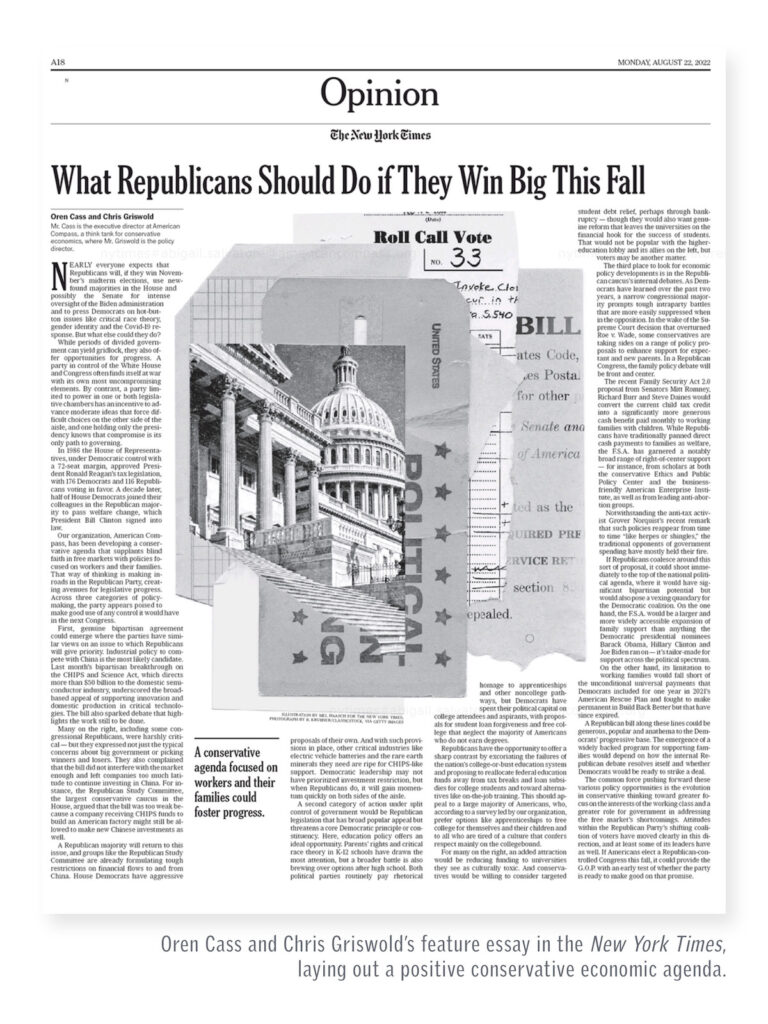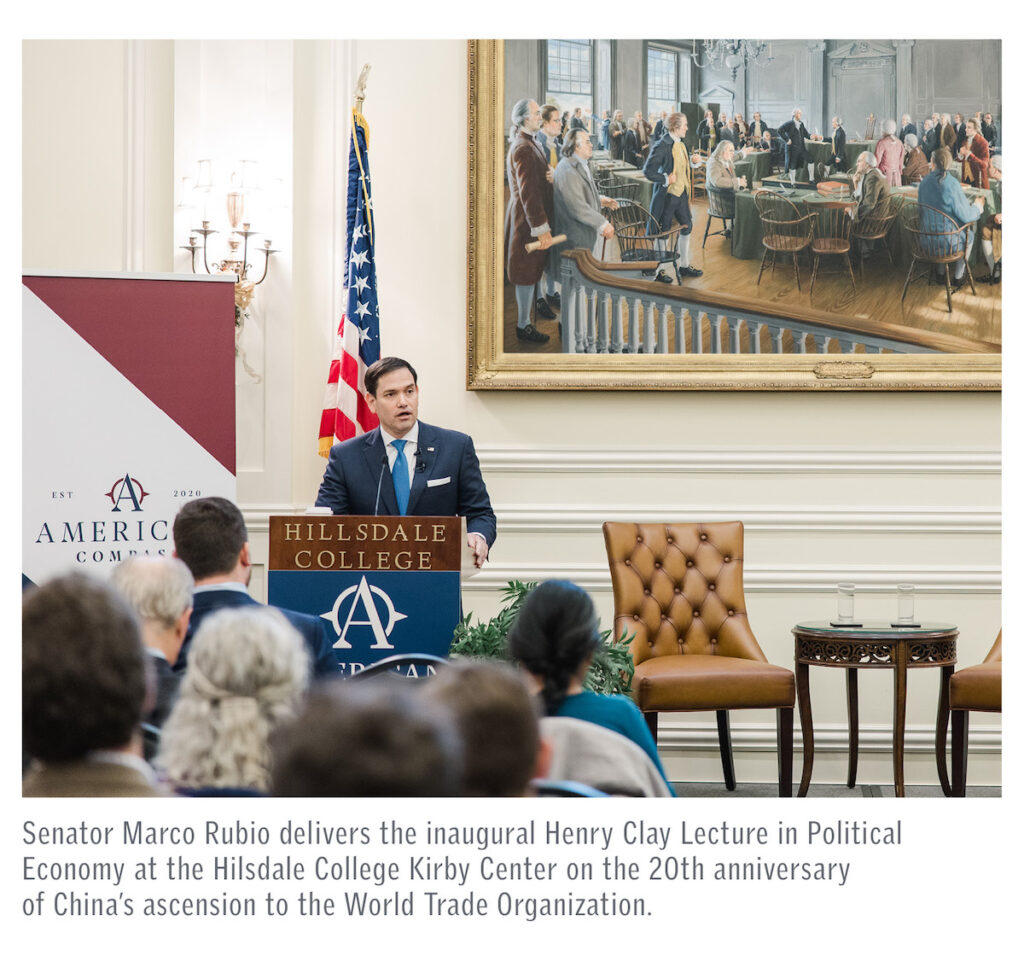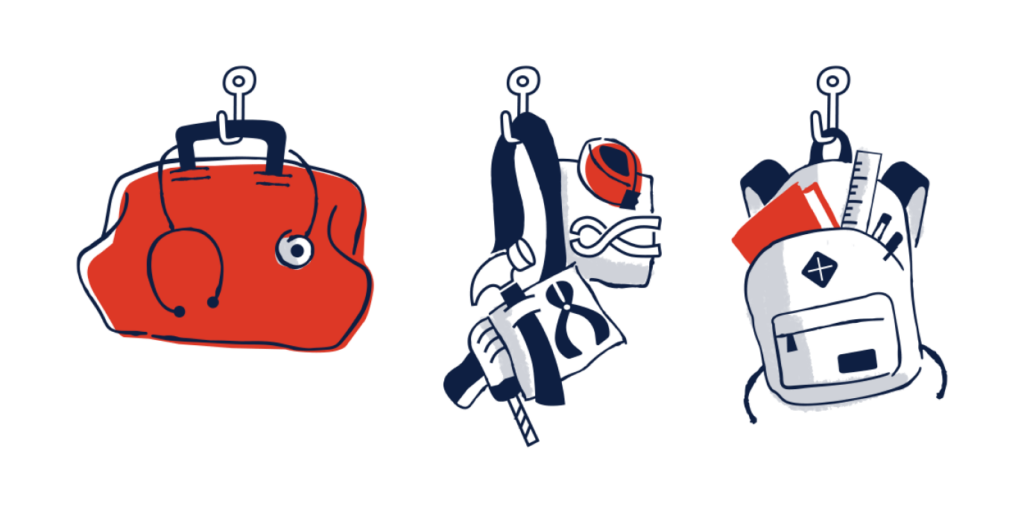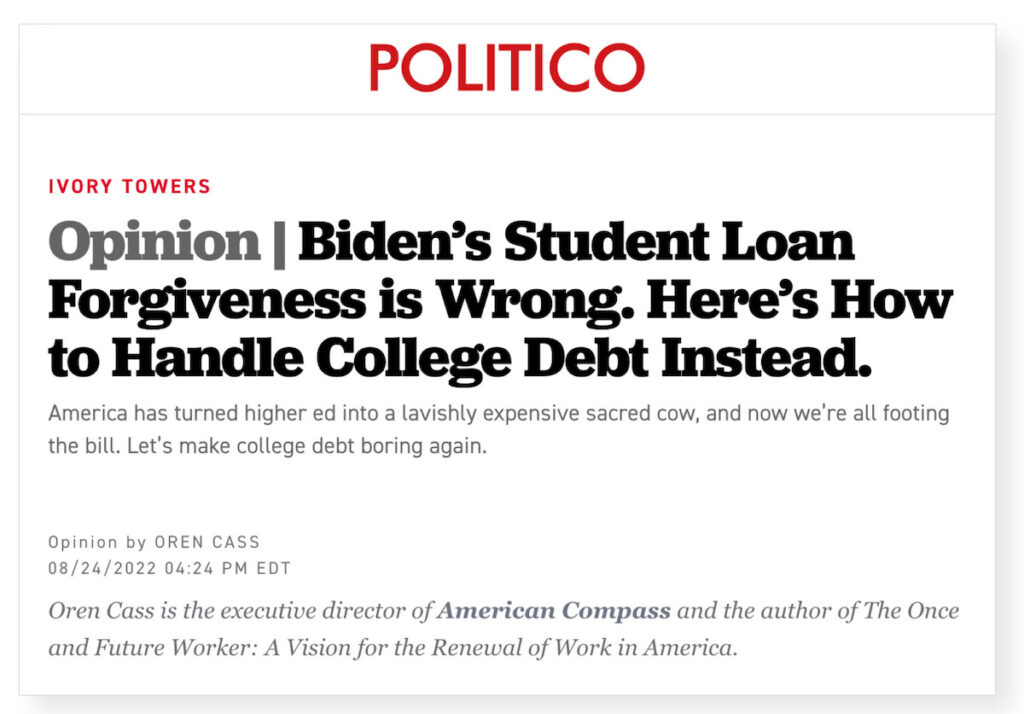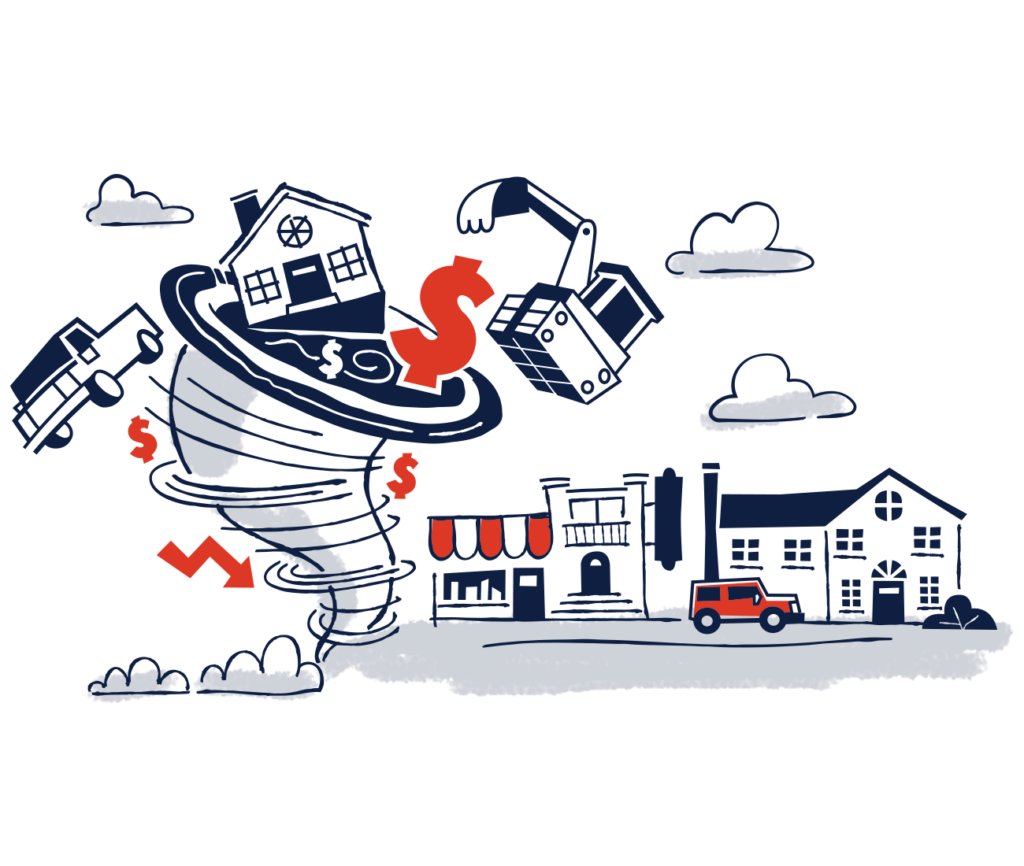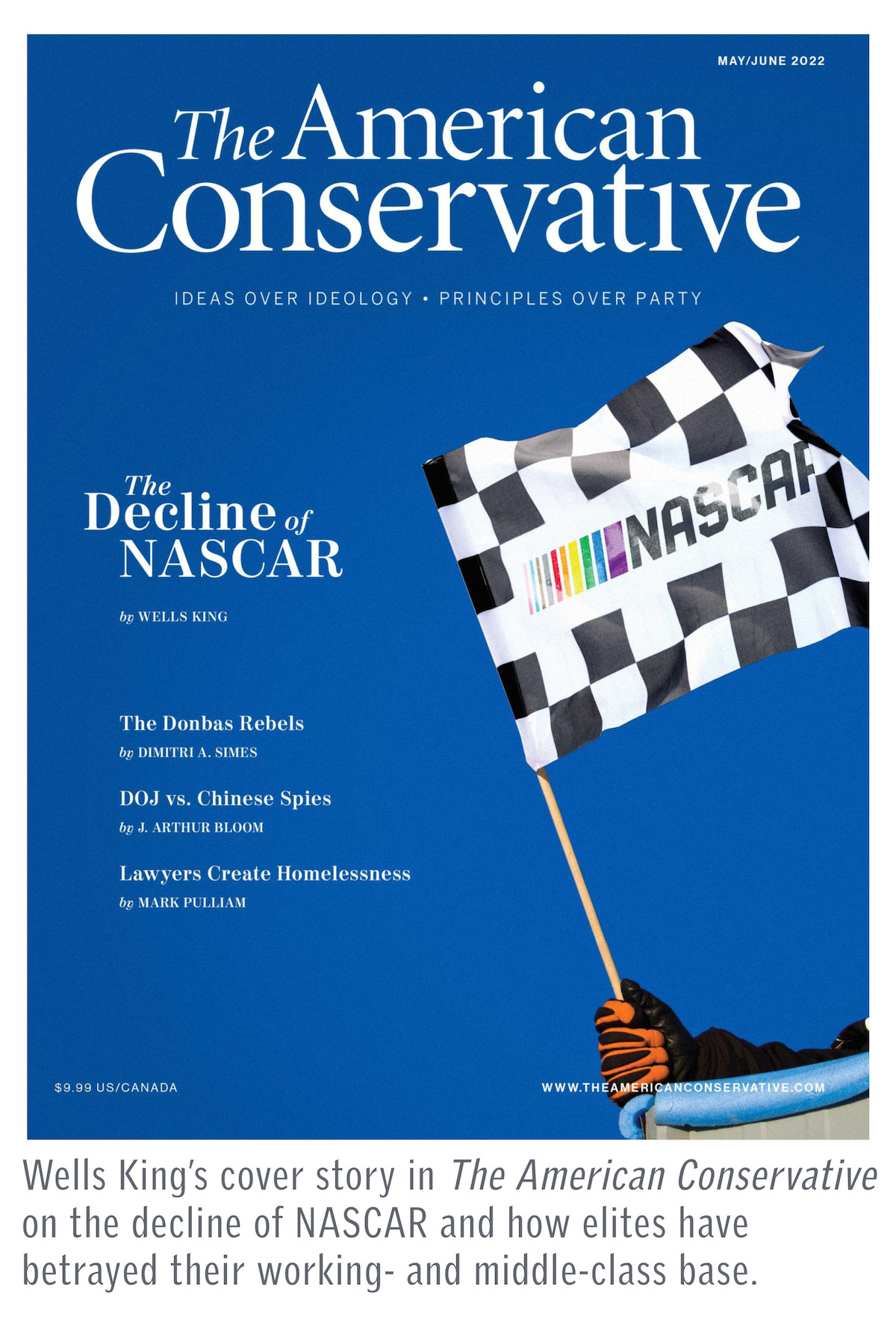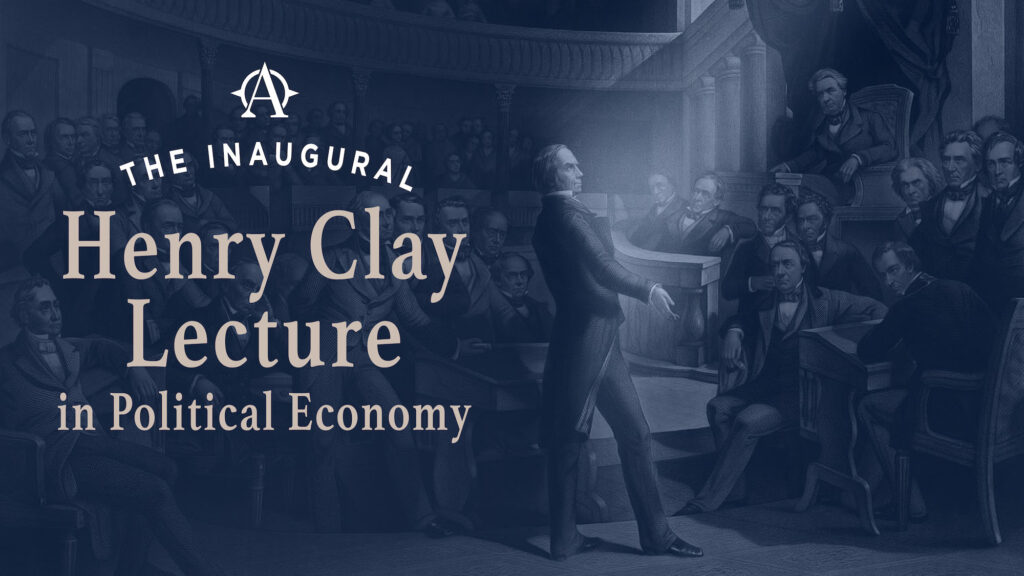
Founder’s Letter
By Oren Cass
An obsessive and paranoid reader of the New York Times opinion page might notice something peculiar about my essay, “The Communal Power of a Real Job,” published in August 2019. The byline reads, “Mr. Cass is the author of The Once and Future Worker,” making no reference to my employment at the time as a senior fellow at the Manhattan Institute. This was not by accident.
Think tanks tend to advertise proudly their role in work published by the Paper of Record, but here the Institute demanded to go unmentioned. It wanted no connection to the subtitle that the Times had written, which read, “Conservatives should look beyond libertarianism and embrace workers.” Everything about the situation was bizarre: The phrase at issue was a mild one, written by an editor, accurately summarizing the essay. If people did want to take offense and charge the Institute with anti-libertarian heresy, the particular wording of the byline would have been immaterial. No matter. Preserving the place of libertarians in the conservative coalition was this important.
I tell this story not to impugn the Manhattan Institute, which consistently supported me in tackling such topics, even as it sought to manage the external blowback, but to make tangible the intellectual environment into which American Compass launched just a few months later, with a mission to restore an economic consensus that emphasizes the importance of family, community, and industry to the nation’s liberty and prosperity. A consensus is a difficult thing to define, operating often through unchallenged assumptions, topics avoided, and subtle cues that convey within a coalition what members in good standing should believe. How can anyone determine objectively a status quo ante from which we depart, or chart the progress made?
We must mark the fixed positions where the subtext bubbles to the surface and gets plainly said, allowing us to see where we have been and how far we have come. In the summer of 2019, a disavowal of libertarianism in the New York Times was so far beyond the conservative coalition’s pale that a leading think tank would go to absurd lengths to disassociate itself from the sacrilege. Fast forward to 2022, and Senator Tom Cotton declared in a speech at the Reagan Library, “Whereas libertarian ideas have helpfully influenced domestic tax and regulatory policy, these ideas often falter in a world of borders.” A few months later, Ambassador Robert Lighthizer, U.S. Trade Representative in the Trump administration, delivered the keynote address at the Intercollegiate Studies Institute’s American Economic Forum. “Libertarianism,” he said, “is a philosophy for stupid people,” to raucous laughter and applause.
Continue Reading the Founder’s Letter…
Breaking Through
American Compass reached an important inflection point this year. The platform we have built for a new conservative economic agenda—with its strong intellectual foundation, robust organizational infrastructure, and concrete policy proposals—is welcoming converts and playing host to the policymaking process. The Heritage Foundation now supports industrial policy. The American Enterprise Institute has turned against tax cuts. And elected officials are signing on, working closely with us to translate ideas into action.
“Oren Cass’s pro-worker, pro-family think tank has exercised surprising influence on the broader conservative movement.”
—The American Conservative
Our leading role is evident on issues ranging from labor to family to education to industrial policy. The start of the year brought a meaningful shift among Republican lawmakers toward greater worker power. Drawing on American Compass policy director Chris Griswold’s “Better Bargain” white paper, Senator Marco Rubio joined Congressman Jim Banks, chairman of the Republican Study Committee, and 14 co-sponsors to introduce the TEAM Act of 2022, which would provide workers with both a new avenue for collective representation in the workplace and a seat on the corporate board. The bill was previewed by Oren Cass in the Financial Times, where he described it as an example of how “the Republicans’ priorities have shifted measurably in the direction of workers’ interests.”
Conservative priorities have also shifted toward the interests of the family, with many on the right-of-center embracing the idea of a social insurance system for working families proposed by American Compass’s Oren Cass and Wells King in “The Family Income Supplemental Credit.” In June, Senators Mitt Romney, Richard Burr, and Steve Daines adopted this framework for their “Family Security Act” proposal, winning widespread endorsements from conservative organizations and scholars like the American Enterprise Institute’s Yuval Levin and Scott Winship and the Ethics and Public Policy Center’s Patrick Brown.
“There is hard work being done to shift the political and intellectual foundation of the right by figures such as Oren Cass [at American Compass].”
—Malcolm Kyeyune, Compact
Growing bipartisan concerns about erosion of American technological and manufacturing prowess, and China’s control of key supply chains, built to a crescendo this summer during debate over the CHIPS Act, which directs public funding to incentivize semiconductor manufacturing in America. American Compass had been working intensively on this issue since early 2021, when we published our Guide to the Semiconductor Industry and a feature essay in National Review on “America’s Chip Slip.” As the leading conservative advocates for the bill, which represented a critical step forward in reshoring critical manufacturing and rebuilding America’s domestic industrial base, the arguments we advanced on our own website and at CNN and The American Conservative were cited by “multiple Republican senators … pushing back on a Wall Street Journal editorial opposing the bill,” reported Fox News. The bill’s passage represents an important inflection point in the nation’s economic consensus, abandoning blind faith in globalization and signaling that America may finally be ready to get serious about returning critical industries to our shores.
“Business-skeptical conservatives are solidifying their position in the conservative establishment… American Compass is hammering out a post-corporate conservatism.”
—The Washington Post
In September, our major investment in building the case against the American education system’s “college-for-all” approach led to Senator Tom Cotton’s introduction of the American Workforce Act, modeled on our Workforce Training Grant proposal. The bill would provide grants to support on-the-job training in apprenticeship-style arrangements, offering support to Americans on non-college pathways equivalent to what their on-campus peers can receive.
In the Washington Post, Henry Olsen called Senator Cotton’s bill “exactly what workers without college degrees need” and also “the type of flexible, nondoctrinaire thinking a conservative workers’ party needs.” In an interview with Senator Cotton, radio host Hugh Hewitt called it “an unqualified great idea,” while the senator credited its origin to the “creative scholars” at American Compass.
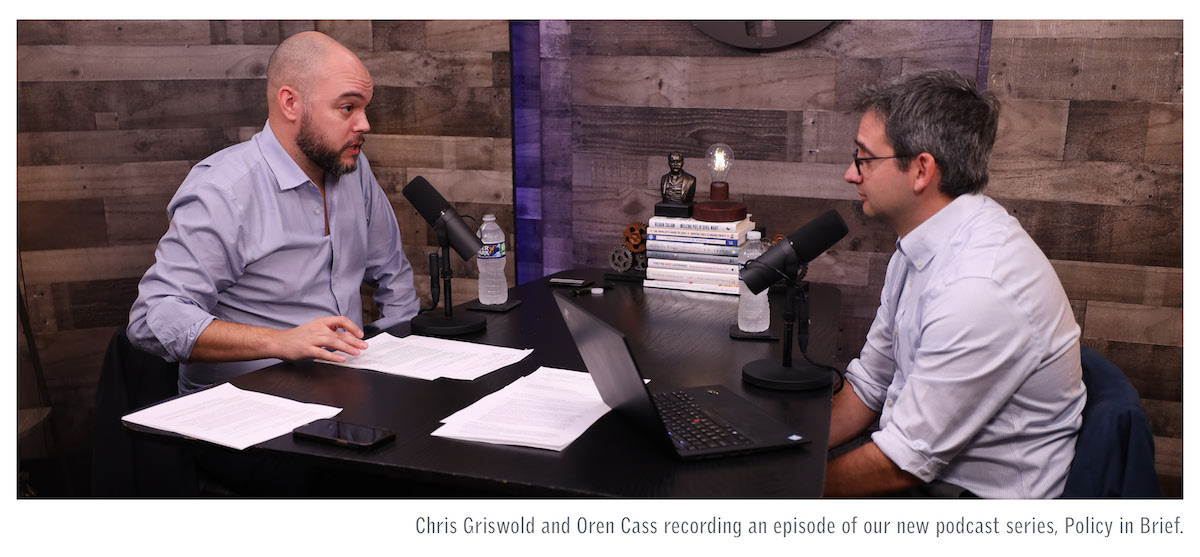
Our success has become a story in its own right. In its feature coverage of new institutions on the American right-of-center, The Economist highlighted American Compass as “among the more sophisticated,” with a “focus on wonkish proposals,” which have been “influential with lawmakers.”
“More sophisticated … wonkish proposals … influential among policymakers.”
—The Economist
In September, The American Conservative published “American Compass, Moving the Needle,” providing readers with an in-depth look at our strategy and impact. “American Compass has moved the right-of-center conversation in Washington in a more pro-family, pro-worker direction,” reported John Hirschauer. “In contrast to its rival think tanks, Compass is grappling with the tensions between conservatism and unfettered capitalism.” The article describes “how Compass mobilizes its small team to move the needle on the Hill” with a “targeted strike approach,” through which we have “exercised surprising influence on the broader conservative movement.”
In January, Oren Cass joined the Heritage Foundation’s new president, Kevin Roberts, for a high-profile discussion conservatism’s future at the Reagan Institute. “This week I learned that Heritage agrees with American Compass that there are limitations to the free market and that tax breaks should go to families over corporations,” wrote New York Times Magazine’s Elisabeth Zerofsky. “Seems pretty clear which way the wind is blowing.”
We Are Charting the Course for Conservative Economics.
- Workers supporting strong families and communities
- Markets fostering domestic innovation and industry
Productive Markets
An economy must provide a nation with more than efficiency.
Supportive Communities
An economy is more than transactions between individuals.
Responsive Politics
An economy is successful only if it delivers what people value.
Our Work
Globalization
Ensuring demand for, and investment in, American workers
We work to understand why globalization has failed and what alternatives exist. We develop approaches through which policymakers can rebalance America’s role in the global economy. This spring, we released a wide-ranging collection on the topic titled Regaining Our Balance: How to Right the Wrongs of Globalization. It opens with an essay by Oren Cass exploring how neoliberalism got globalization so wrong, arguing that it is capitalism’s antithesis, not its logical endpoint. Capitalism relies on a specific set of conditions and a well-governed market to deliver widespread prosperity—and today’s global economy lacks those prerequisites. The intellectual forebears of modern market capitalism, Adam Smith and David Ricardo, “stated their propositions in terms incompatible with modern globalization. Both assumed that capital would remain in the domestic market.” Furthermore, their theories assumed trade of goods for goods—not assets and IOUs.
Former Senator and Attorney General Jeff Sessions contributed an essay to the collection recounting his experience as a conservative politician embracing the free-trade consensus—and how he came to see the damage it wrought over decades on the very communities he and his colleagues represented in Washington.
For decades, the Uniparty—that bipartisan set of constituencies in politics, big business, academia, and the Washington blob—had a near-monopoly on the American approach toward globalization. Our Uniparty Game gave readers a chance to test their wits against this witless case for globalization, by trying to determine which member of the Uniparty said a series of misguided quotes. It’s surprisingly difficult to tell which side of the aisle the nonsense originated from—globalization knows no national borders nor party affiliations. Meanwhile, “Wrong All Along” digs even deeper into this failed consensus and the fallacies on which it was built, and “Where’s the Growth?” assesses the results. Yes, trade creates both winners and losers, but the past few decades have seen the promised benefits never materialize while the costs dismissed as implausible have proved all too real.
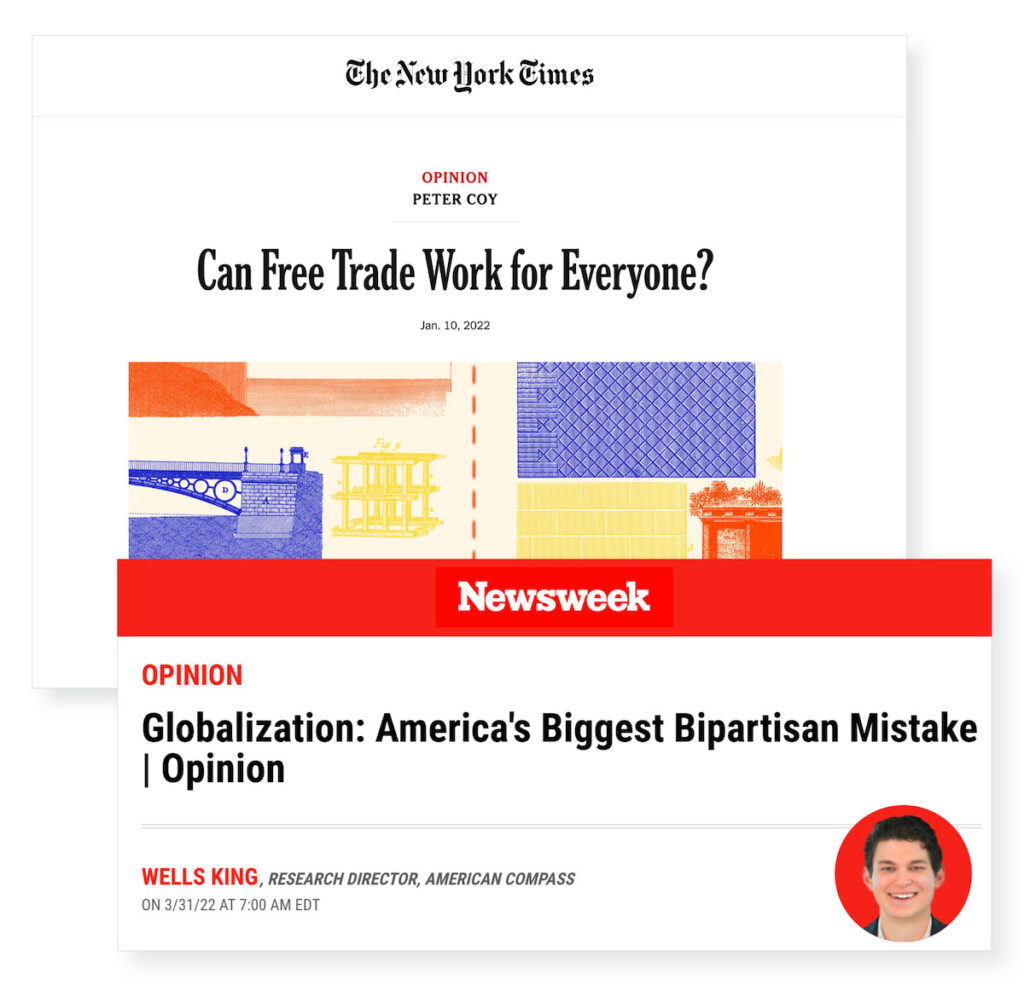
We invited scholars from across the political spectrum to weigh in on our perspective on globalization. We published comments from the former U.S. Trade Representative Robert Lighthizer, along with scholars from the American Enterprise Institute, Howard University, Heritage Foundation, Coalition for a Prosperous America, and Institute for Progress, among others. Their perspectives ranged widely, and one of our harshest critics, Donald Boudreaux, praised our willingness to engage in substantive debate on such a critical topic: “Oren and his colleagues at American Compass deserve much credit for publishing Stan’s harsh critique. These days, such generosity, civil-mindedness, and scientific integrity are too rare. I tip my hat to Oren and his colleagues.”
For policymakers looking ahead to a potential post-globalization world, the question is how to rebalance global flows of goods, capital, and labor. In “The Balancing Act”, we propose a series of policy shifts that would go a long way toward finding that balance in market access, investment, global rules, and immigration.
Industry
Supporting the indispensable investment and innovation of the goods-producing sector
This year saw serious progress on industrial policy, with American Compass leading the fight for a more aggressive approach to bringing industry back to our shores.
We argued for more than a year for passage of what became the CHIPS and Science Act, telling the story of “America’s Microchip Slip”, preparing a comprehensive Guide to the Semiconductor Industry, and rebutting objections point-by-point in “Pass the CHIPS, Please”. Policy director Chris Griswold joined a panel discussion at the Bipartisan Policy Center to discuss how a smart industrial policy would boost national economic competitiveness, and was hosted by the Cato Institute twice for debates with Scott Lincicome, its leading expert on the topic. Drawing lessons from another industry, “The Import Quota That Remade the Auto Industry” tells the story of the quota imposed on Japanese auto imports during the Reagan administration. In an accompanying essay in National Review research director Wells King and former summer analyst Dan Vaughn explore how, in the face of state-supported Japanese automakers outflanking their American counterparts, Reagan negotiated a quota that saved Detroit. Just four years of limits on Japanese car imports gave American car manufacturers a chance to retool, while incentivizing Japanese carmakers to build manufacturing plants in the U.S., creating hundreds of thousands of new American jobs.
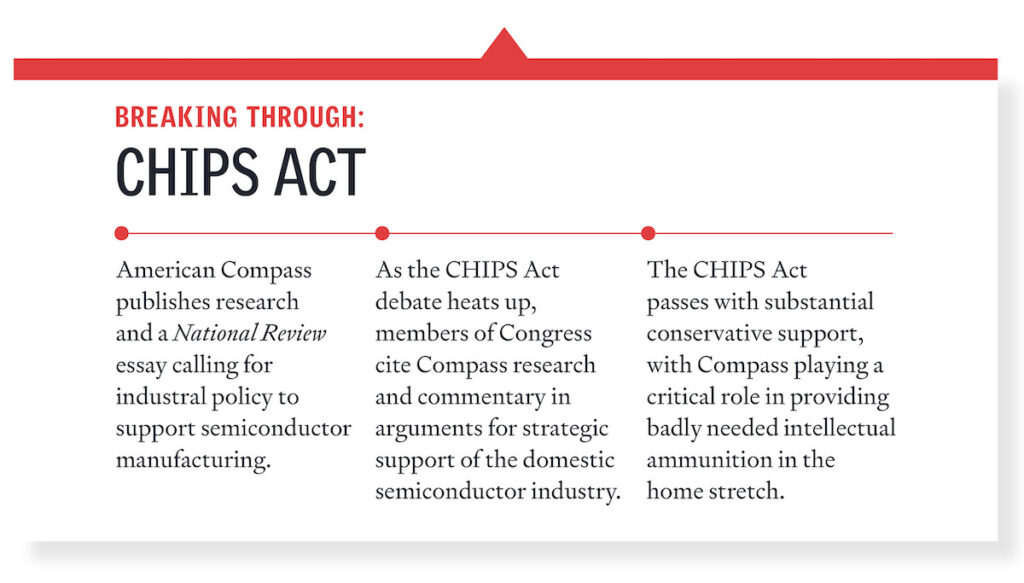
Education
Equipping Americans to build decent lives in their communities
Americans see equipping young people with the skills and values to build decent lives in the communities where they live as more important than maximizing academic achievement. That’s part of what we found in our survey of American students and parents, which exposed just how far the American education system is from fulfilling its purpose and the catastrophic outcomes that are the result.
On the other side of this failed pipeline, our report on The False Promise of Good Jobs demonstrates the mismatch between the obsession with producing college graduates and the skills demanded in the labor market. The jobs we’re educating for simply aren’t out there, leaving people underemployed and strapped with debt.
There is, of course, a better way. In Retooling American Education, we convened a wide range of policy experts and practitioners to describe the practical steps that policymakers can take to refocus public education on the non-college pathways that would best serve most Americans.
One proposal in particular has already gained traction. The Workforce Training Grant describes a comprehensive approach to the development of a robust, employer-led training system, a version of which Senator Tom Cotton introduced this year as the American Workforce Act.
An important argument running through our work on education is that expanding options and funding alternatives is not enough: the existing higher education industry, “Big Ed,” must be cut down to size. One reason is that much of the money is simply wasted, and reallocating it offers a budget-neutral opportunity to improve public services. Another is that excessive spending has created toxic economic and cultural incentives for young people to spend their late adolescence enjoying the “amusement park entitlement” of a college campus. In “The Banality of Student Loans”, Oren Cass makes the case for reconfiguring higher education financing to offer a single, standard grant to cover partially the cost of a public university degree, and otherwise allow the industry to fend for itself.
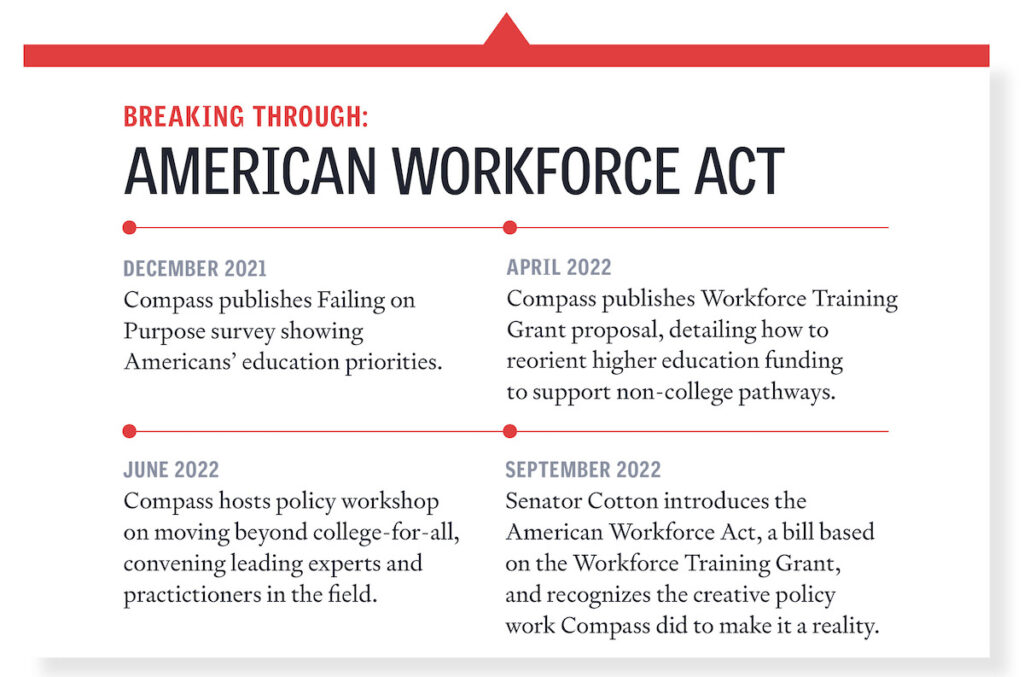
Labor
Guaranteeing workers a seat at the table
The American labor movement has become deeply dysfunctional. Workers feel largely alienated from the Big Labor unions, which appear focused primarily on promoting progressive politics.
At 6%, the union membership rate among private-sector workers is lower than at the time of the National Labor Relations Act’s passage in 1935. That law not only fails to serve modern workers effectively, but also precludes experimentation with alternative forms of organizing.
What a tragedy. In a well-functioning capitalist system, participants meet as equals able to advance their interests through mutually beneficial relationships. Organized labor has traditionally been the mechanism that gives workers an institution of solidarity, power in the market, and representation in the workplace. Strong worker representation can make America stronger.
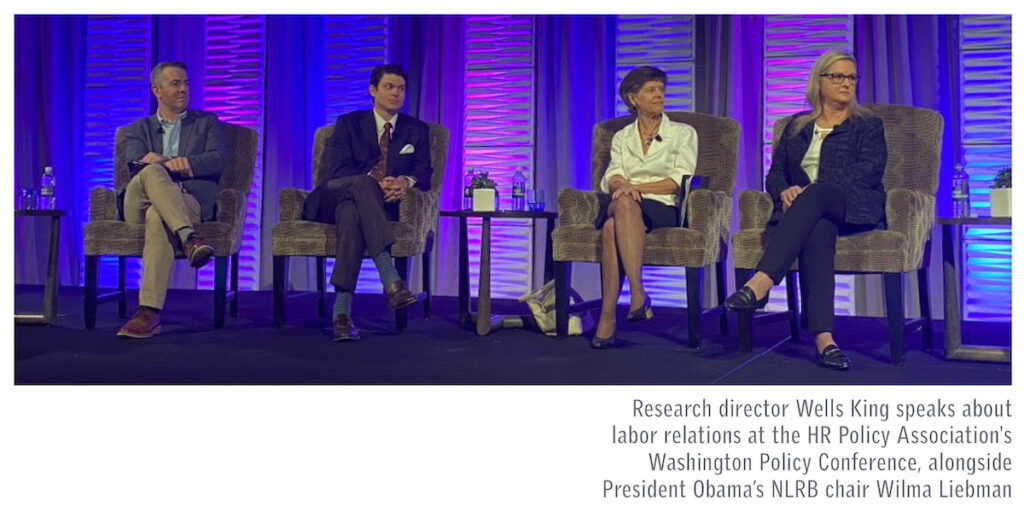
In a feature essay in Comment magazine, policy director Chris Griswold explored the role that worker power plays in civic friendship—the ties that bind us together in pursuit of a shared political project—and how a weakened labor movement threatens those bonds. As Griswold writes, “American workers have been sent the clear message that they are not at all full participants in a shared enterprise, but every bit the disposable inputs market fundamentalists tell them they are.” Worker power is not only a matter of improving wages, but of solidarity and civic friendship.
Conservative winds are clearly shifting on the question of labor, with many more policymakers and leaders expressing the vital importance of workers having a voice and a seat at the table. Since our first collection on the topic in September 2020, when our statement endorsing a conservative embrace of organized labor was met with great interest and more than a little confusion, it is no longer taken for granted that conservatives reflexively favor capital over labor. We’ve seen a healthy rebalancing, most notably in the form of this year’s TEAM Act, introduced by Senator Marco Rubio and Congressman Jim Banks, chairman of the Republican Study Committee. The bill would provide workers with a seat in the boardroom and an avenue for collective voice in the workplace outside of the traditional labor union, creating more flexibility for workers who see Big Labor as overly political.
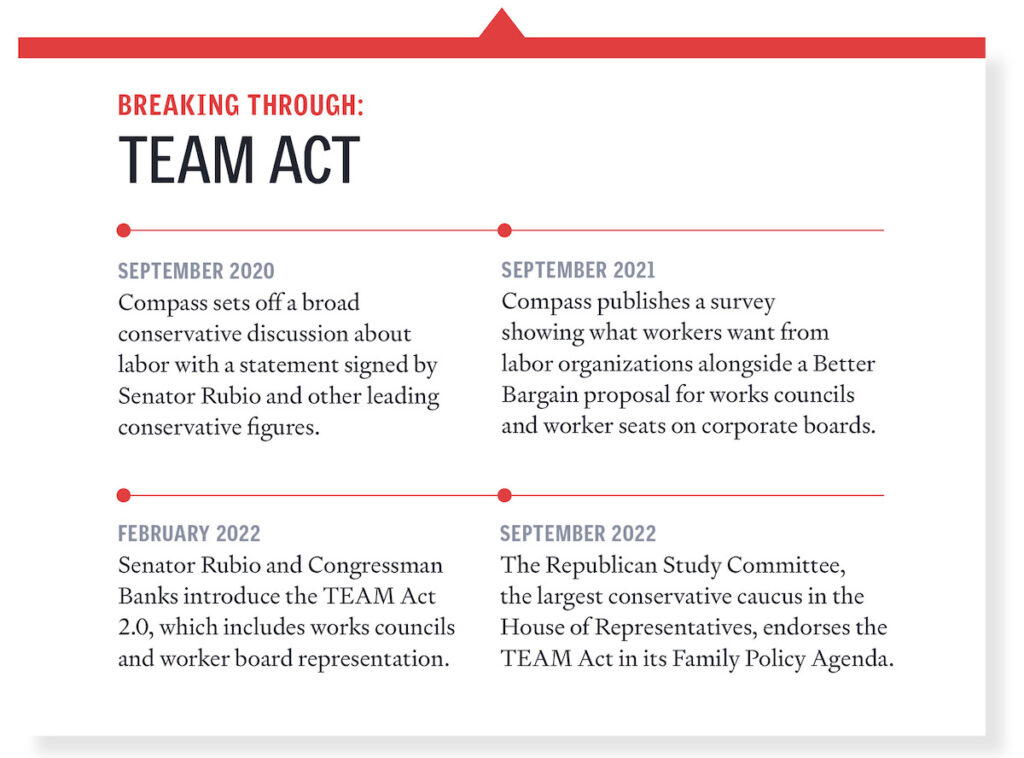
Family
Supporting the indispensable institution
The family is the indispensable institution, the only one capable of producing a next generation and preparing it for the burdens of productive citizenship. Its ongoing collapse poses the greatest threat to American liberty and prosperity.
Much of our attention this year has been focused on the idea of a “child allowance” or “family benefit.” In early 2021, Senator Mitt Romney proposed the Family Security Act, which would give each family several hundred dollars per month for each of their children. Oren Cass and research director Wells King offered their own proposal for a Family Income Supplemental Credit (Fisc), which attracted widespread interest from conservative analysts and policymakers who preferred how it targeted support to working families. Cass argued for the advantages of this approach in the New York Times and in an event with Senator Romney—and this advocacy paid off.
This year, Senators Romney, Richard Burr, and Steve Daines proposed a revised Family Security Act 2.0 that adopted the Fisc’s structure, gaining widespread support from conservatives who value its focus on working families. Senator Josh Hawley has proposed a family benefit that uses the Fisc’s framework as well.
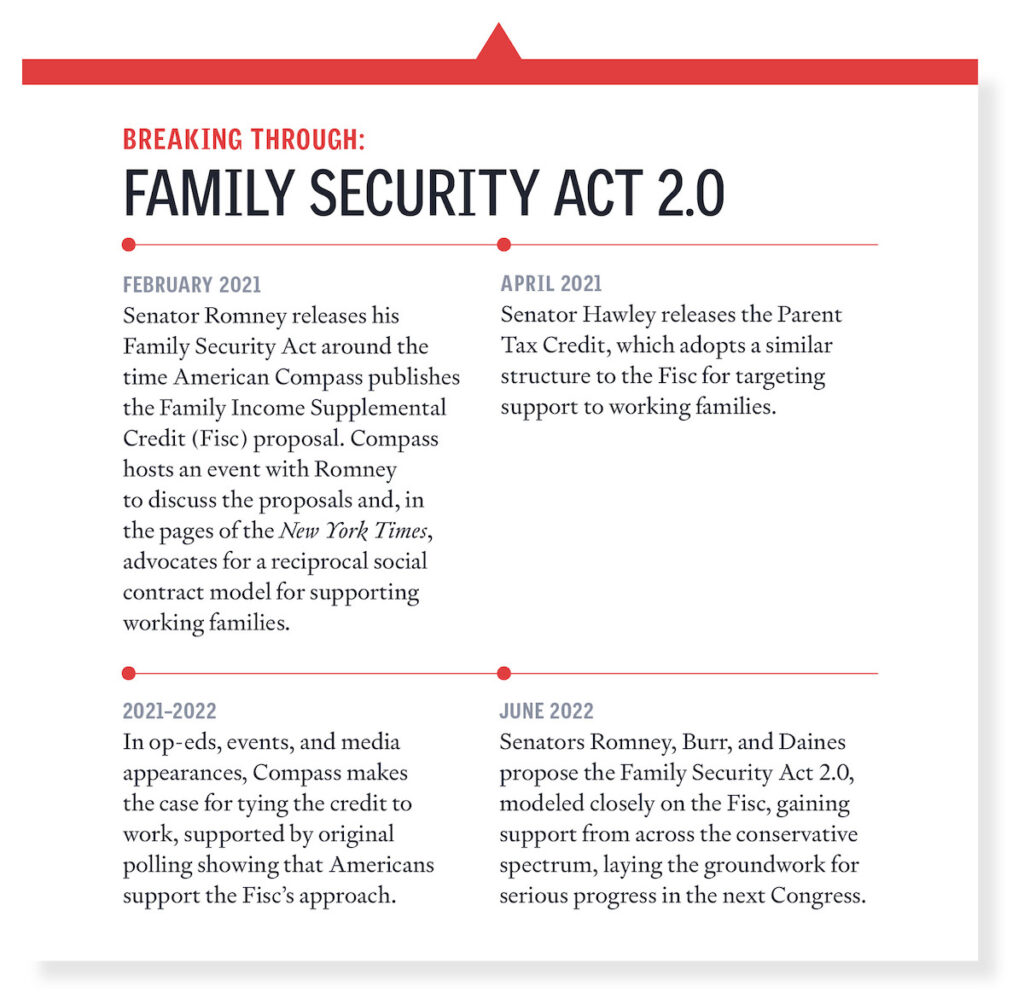
Financialization
Directing capital and talent toward productive investment
Robust financial markets are vital to a productive economy. But they are not an end unto themselves. Their task is to facilitate investment by connecting capital to its most valuable uses at the lowest possible cost.
Building on our work on Coin-Flip Capitalism and research on how corporations are failing to invest in our nation’s productive capital base, we’ve continued to engage with the financial industry’s staunchest defenders.
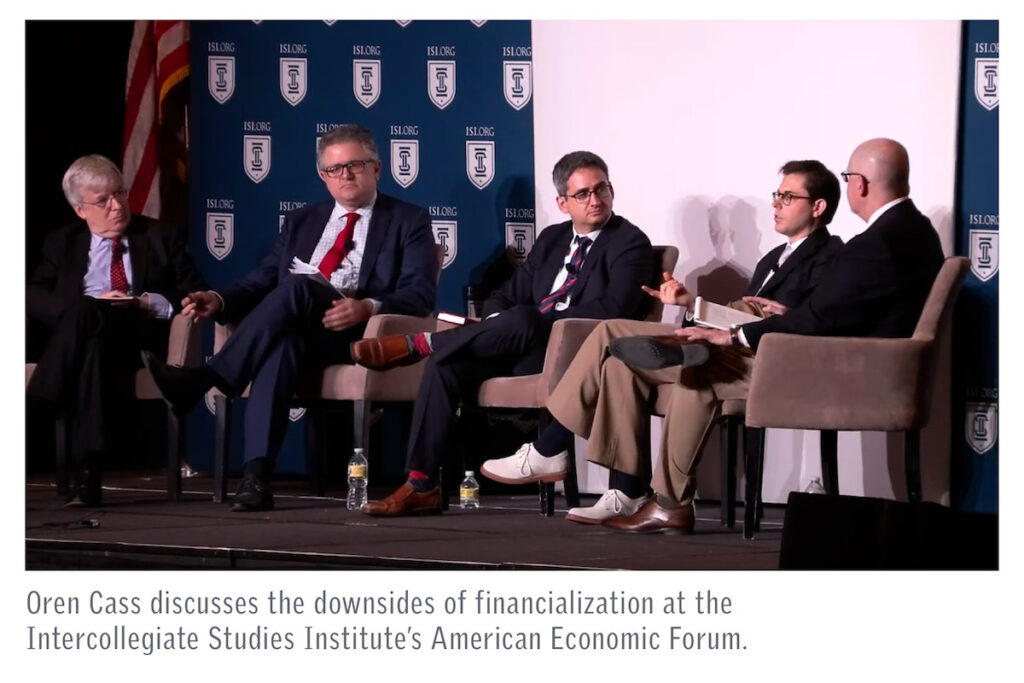
Early this year, the American Enterprise Institute’s Michael Strain spoke with Oren Cass on our Critics Corner podcast series, where we invite our critics to join us for a good-faith discussion of where and why we disagree—and some unexpected common ground. Oren also joined David Bahnsen for a two-part conversation on his Capital Record podcast at National Review, digging into where our perspective departs from that of free-market fundamentalism on everything from trade to labor to financial markets.
Tech
Developing the tools to regulate the Information Age
The Information Revolution of the past 30 years has wrought the most dramatic economic and social transformation since industrialization. Its products, services, and infrastructure mediate the transaction of most commerce, the dissemination of most ideas, and an increasing share of human interactions.
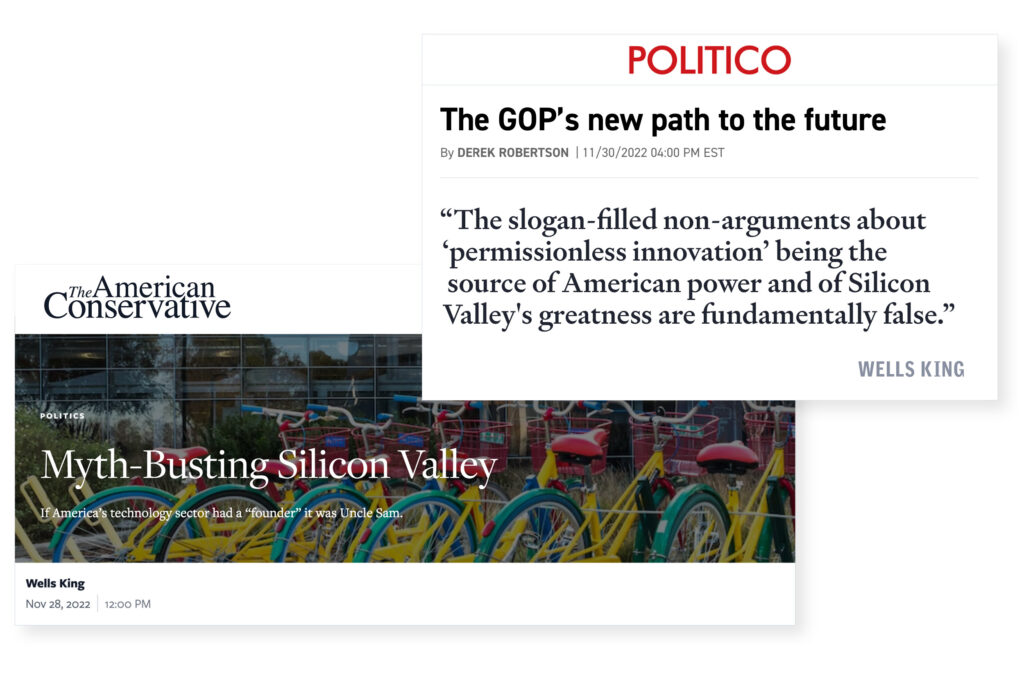
We have focused particular attention on the issue of protecting children online. Chris Griswold’s lead essay in the spring issue of National Affairs, “Protecting Children from Social Media”, draws an analogy between current debates and ones early in the prior century over child labor. A range of economic interests and ideological commitments stand arrayed against what should be a fundamental concern for the well-being of children. Rather than worry about implications for “growth” and “innovation,” American policymakers should focus on preserving an appropriate environment for children’s development, for instance by creating an easy mechanism for online age verification.
Understanding America
Listening to the concerns and aspirations of the American people
At American Compass, we work to understand the wide range of values that shape American lives and the ways those conflict with the assumptions that guide national policy debates. We develop tools to help policymakers better understand their constituents and the areas in which their policy agendas are falling short.
For instance, rather than generating the usual partisan fodder, our public opinion surveys explore Americans’ life circumstances and priorities. Our Home Building Survey examines the family structure and caregiving arrangements that Americans of different education and income levels prefer, while our Not What They Bargained For Survey examines the employment conditions of American workers and the labor-management relationships they desired. A two-part survey, Failure to Launch and Failing on Purpose, studies the paths that young Americans take through the education system and the purposes they and their parents most want that system to fulfill.
In a Compass Point essay, philosopher Oliver Traldi discussed the difficulty and importance of protecting the public square from the “cult of expertise,” writing:
“This rational populism has not been sitting well with the expert class, which finds democracy an inconvenient obstacle to technocratic rule. Thus the recent emphasis on ‘cognitive biases,’ which treat the typical citizen as not only a non-expert himself, but also incapable of identifying the real experts or aggregating his opinions with other non-experts to achieve a reasoned result. … Alongside the technically framed analyses of how people misprocess correct information comes an assumption that they are also cheaply programmable, easily gulled by puppeteer propagandists and ‘Fake News.’ Only the experts, then, can tell us who is truly an expert. Only someone untrustworthy would not trust them.”
Membership
Our Members
- 137 members
- Living in 15 states
- Working in 15 congressional offices
“American Compass has, by a good amount of work and a great amount of wit, built a vocabulary that allows people to talk about these economic topics in a way that is more nuanced and focused on our needs today. It has allowed offices on the Hill and young scholars-to-be to be able to actually engage on these ideas in a way that won’t immediately exile them.”
Wes Hodges, Former Coalitions Director
The American Compass membership group swelled to over 130 members this year, spread across 15 states and playing leading roles on Capitol Hill, at nonprofits, and in media, law, and academia. Our members comprise a truly engaged community, which gathers every month for a happy hour at the American Compass office, for salon dinners and day-long workshops, and for a reception to give career advice to summer interns in Washington. At our annual holiday party, which kicked off at the “Coin-Flip Capital” headquarters—our lighthearted jab at the private equity industry—new and old friends came together, many with family and children in tow.
The highlight again this year was our second annual membership retreat, where members convened on the Eastern Shore of Maryland for a weekend of policy discussions, a boat ride, trivia, and time with good friends and their families. The program featured discussions about realignment politics and messaging, media and institutions, corporate governance, and national security. Featured guests included Hon. Jeff Sessions, Washington Post columnist Henry Olsen, and American Affairs editor Julius Krein.
Compass Online
We rebooted AmericanCompass.org this year. When it was first built for our launch in 2020, we didn’t have much to feature; over the last two-and-a-half years we have produced hundreds of essays, proposals, blog posts, podcasts, and more. We aimed to rebuild it with policymakers in mind, creating a truly in-depth resource on every topic we work on, explaining the roots of conservative economic thinking and laying out actionable policy proposals.
- Charting the Course presents the underlying principles of conservative economics, introducing visitors to the importance of Productive Markets, Supportive Communities, and Responsive Politics.
- A page dedicated to each of our policy areas explains in detail our approach to the topic and highlights our most important work.
- The Commons is our home for commentary from across the political spectrum, including our popular Compass Point essay series.
- Our new Library makes it easy to search and filter our research, essays, commentary, and more.
New Initiatives
As the go-to source for serious, conservative policy ideas, this year we launched several new initiatives to reach policymakers and other leaders more effectively with our thinking and proposals. These new tools have multiplied our reach and influence.
Policy Briefs
Our policy brief series presents policy proposals in a digestible format, laying out the case for action, the steps policymakers should take, responses to “frequently raised objections,” and reading suggestions to dig into the issue further.
Thus far, we have proposed the following ideas in our policy briefs:
- Workforce Training Grant
- Online Age-Verification System
- Import Certificates
- Market Access Charge
- Global Tariff
- Worker-Run Benefits
- Student Debt Relief in Bankruptcy
- Self-Financing by Colleges
- Family Income Supplemental Credit
Alongside each policy brief, we release an episode of our new podcast series, Policy in Brief, in which executive director Oren Cass and policy director Chris Griswold discuss the proposal, the research backing it up, and come up with some creative bill names.
Case Studies
Many of our policy proposals have a proven track record of success that few people are aware of. Our case studies dig into these stories, showing the critical role government has played in the success of industries like auto manufacturing and technology.
Few Americans would think of President Reagan as an industrial policy booster, but in “The Import Quota that Remade the Auto Industry,” we show how he negotiated a quota on Japanese car imports that bought Detroit time to retool and spurred massive foreign investment in a new manufacturing base in the South.
Capitol Hill may be far from Sand Hill Road, but Congress has its own, incredibly successful venture fund in the form of the Small Business Innovation & Research program. “Uncle Sam’s Top-Performing Venture Fund” shows how early stage investing through “America’s Seed Fund” has provided critical support to the major technological breakthroughs made by many of America’s most innovative companies.
Silicon Valley’s “cult of the founder” has led many to believe that our most successful technology companies were the result of “permissionless innovation” in a Palo Alto garage. But in “Silicon Valley’s Public Garages,” we examine the indispensable and effective role of public policy in building the digital age.
Hill Bulletins
Several times a month, we share this work with policy staff on Capitol Hill through our Hill bulletins—curated emails from policy director Chris Griswold that explain our latest policy proposals and offer our expertise to offices interested in pursuing them. Through these bulletins, we have reached several thousand House and Senate aides, leading to productive discussions and inroads to policymakers open to our approach to conservative economics.
Policy Workshops and Sorties
This year we began bringing together experts, writers, and practitioners for day-long workshops on pressing issues like financialization and education reform. At our Sorties, we invite a select group of our members to join a featured speaker for a day of learning and discussion: This year, we hosted a Spring Sortie on monopoly power and competition policy and a Fall Sortie on the financialization of the American economy. Over the summer, we convened education experts, reformers, and practitioners for a policy workshop on rethinking the “college-for-all” model in the U.S.
Henry Clay Lecture
At the very end of 2021, we hosted our first Henry Clay Lecture in Political Economy, featuring Senator Marco Rubio on the 20th anniversary of China’s ascension to the World Trade Organization assessing how the flawed bipartisan economic consensus went so tragically wrong and where conservative economic policy should go from here. Following the lecture, the Washington Post’s James Hohmann interviewed Senator Rubio about the U.S.’s stance toward China, the decades-long, failed embrace of globalization, and how conservatives should think about revitalizing American industry today.
New Office
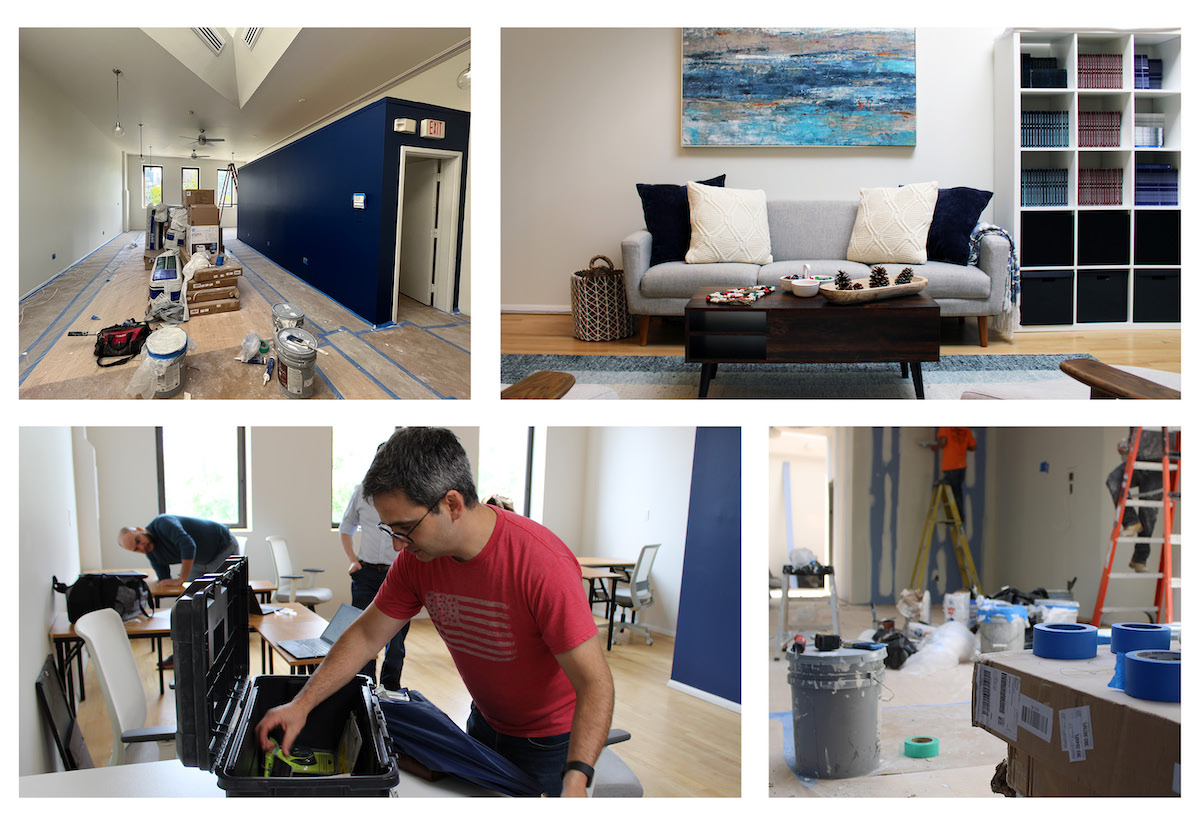
Early this year, we pulled up our stakes at a coworking space we’d outgrown and settled into a new home in Eastern Market, a converted yoga studio that, delightfully, had been called the Realignment Studio. Thus far it’s been a fantastic home for conservative economics, playing host to several events, happy hours, and strategy sessions already this year.
Summer Analysts
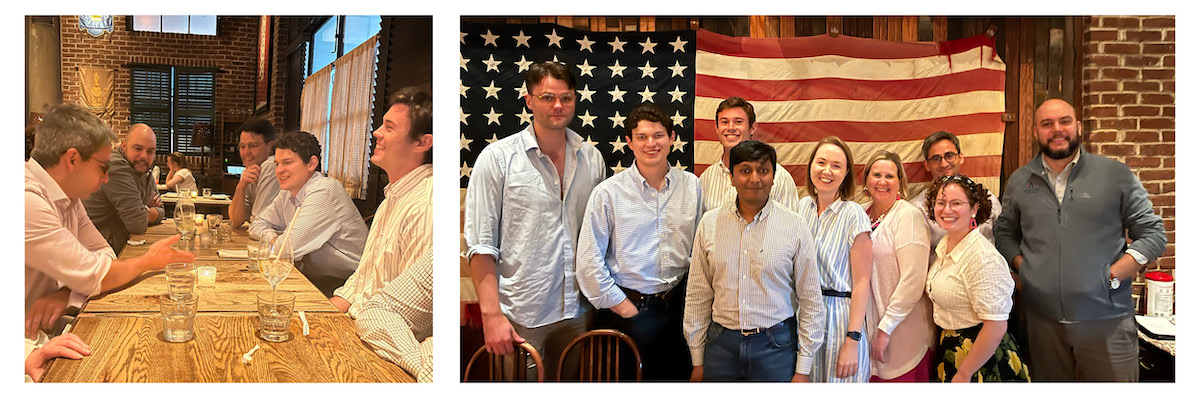
We launched our first-ever internship program this year, hosting three summer analysts for 10 weeks. They worked as integral parts of our team, focused on research, policy, and communications, and engaged with all that Washington has to offer at events, lectures, and a day trip to Mount Vernon.
Help us build a strong foundation.
When we formed American Compass, we knew that the standard base of financial support for right-of-center organizations might not be available to us because of our willingness to question ideas that have long since become stale dogma. For this reason, an active part of our project is developing a network of people and institutions who are committed to a healthy conservatism and a strong nation. We hope you’ll join us in that cause.
How to Support American Compass
You can donate to American Compass via check, wire, stock transfer, or online at americancompass.org/donate. The Navigators Guild is our engaged community of dedicated donors. To learn more about opportunities to participate, please visit americancompass.org/guild.










